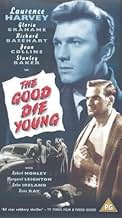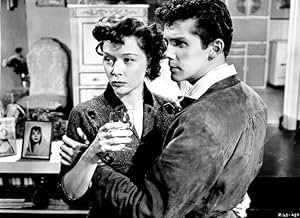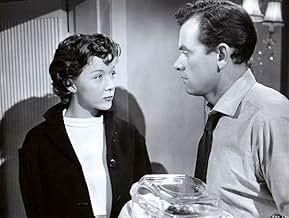Ajouter une intrigue dans votre langueIn London, three otherwise law-abiding good men and their unscrupulous leader are about to commit a serious crime, but for different reasons.In London, three otherwise law-abiding good men and their unscrupulous leader are about to commit a serious crime, but for different reasons.In London, three otherwise law-abiding good men and their unscrupulous leader are about to commit a serious crime, but for different reasons.
Histoire
Le saviez-vous
- Anecdotes(at around 31 mins) The prominent painting in the apartment of Eve (Margaret Leighton) of Rave (Laurence Harvey) as a polo player was clearly altered from a copy of one of an American "old money" socialite and sportsman, Winston Guest, a top polo player in his day.
- GaffesDuring the robbery, Miles Ravenscourt fires 9 shots from a 6-shot revolver without reloading.
- Citations
Miles Ravenscourt: Someone who is quite determined to be most unpleasant about it has a cheque of mine for a thousand which is probably bouncing at this very moment. So if you are determined not to share the money, in a few days from now, you'll be sharing some very lurid headlines.
Sir Francis Ravenscourt: You can't threaten me any more. Public disgrace couldn't be worse than sitting here being reminded that I'm your father.
Miles Ravenscourt: You really do hate me, don't you?
Sir Francis Ravenscourt: I don't hate you. I Ioathe and despise the very sight of you.
- ConnexionsFeatured in Frances Farmer Presents: The Good Die Young (1958)
The film is ultimately about the allure of crime than anything else; those expecting a gangster film will be rather sorely disappointed, with Gilbert's film coming to resemble more a class drama than a crime genre piece. It's bookended by the men clustered together with tensions running high and a sorely undesired predicament looming, a clerk named Joe Halsey (Basehart) narrating to us how it was he and three others got to be occupying a rich playboy's car sizing up an object and wielding pistols; the finale a quite gripping trawl through the murky, cobbled streets of 1950s Britain as police officers; stray freight trains and unfaithful partners in crime each pose their own threats. It's here Gilbert proves he's just as apt at dealing with dramatic action set-pieces as he is engaging us with character: specifically, who's involved; what's at stake; who's going where, and why; the internal 'checkpoints' the characters must reach as well as the sorts of action that must be undertaken, the man having his characters in The Good Die Young pay special attention to both the methodical planning and dealing with each obstacle within an action set piece which needs separately dealing with during the final getaway.
Gilbert executed similarly effective craft later on in his career, namely when he was granted the helming of three separate films within the James Bond cannon. 1977's The Spy Who Loved Me saw an extended scene on board a tanker ship nearer said film's climax and required its lead to first get aboard; find some trapped hostages; recover them only to discover a wall of seemingly impregnable steel; find something which might destroy that; obtain it, and then follow through once again with the next course of action. The attention to such things were initially used to a lesser degree of success in 1967's You Only Live Twice. But in The Good Die Young, a similarly effective craft is evident behind not only the finale but the getting to this point; the film coming to resemble one long flashback told to us by the aforementioned Joe involving a whole group of people brought together through problems with money.
The film does its best to intrinsically link each man, each one being of a respective background in class and career; one of whom is a boxer named Mike Morgan (Baker), a man at the end of his stretch as a fighter - the ring-set howls and wails as another fatal blow is landed upon a poor opponent much to the glee of the crowd echoing down below into the locked room as Mike sits there knowing one of his hands is on the brink of being seriously damaged as it is. Meanwhile, American pilot Eddie Blain (Ireland) refuses orders to ship out to West Germany with the American air force to instead zero in on his wife and her infidelities; whereas narrator Joe maintains a rocky relationship with the mother of his own wife, something he gets involved in so much so that flying back to England from his American-based clerical job to get involved sees him fired.
So each man is rather attuned to their wives, Mike's relationship seeing him admit to lending his hard-earned cash to his own wife's brother if she'd told him to; his ultimate goal to take his large earnings and escape to his beloved. Furthermore, each man's respective situation in each of their jobs sees them hit a proverbial wall bringing about unemployment or redundancy; each of the three men additionally appearing to have served in a respective war and two of them have experiences with near-death or great harm of some kind in that Joe's mother in law attempts suicide and Mike must come to have some serious work done on his hand.
The men are eventually thrust together by the seemingly indomitable Miles Ravenscourt (Harvey), a young man, whom might be richer than he actually is, but whom occupies a plush and far richer locale; a self indulgent man whose home is rife with portraits of himself and whose wife Eve (Leighton) must suffer his begging for more money despite both parties' knowledge of his trouble with gambling debts; a man so estranged from his father, that he hopes to outlive him so that Miles may never see any of his inheritance, such is is ill-minded way with money as the film will go on to document. As previously mentioned, the film is more about the allure of crime or the idea behind a criminal act that'll greatly benefit oneself arriving with a sense of enticement, than most others things. The duality in each of the four men may appear looser than desired, but Gilbert crafts rather-a taut and tight heist film about desperate people doing desperate things at desperate times.
- johnnyboyz
- 15 janv. 2011
- Lien permanent
Meilleurs choix
- How long is The Good Die Young?Propulsé par Alexa
Détails
- Date de sortie
- Pays d’origine
- Langue
- Aussi connu sous le nom de
- Vier bleiben auf der Strecke
- Lieux de tournage
- Barbican Estate, City of London, Angleterre, Royaume-Uni(Barbican train platform used for the fictional High Street Station)
- sociétés de production
- Consultez plus de crédits d'entreprise sur IMDbPro
- Durée1 heure 40 minutes
- Couleur
Contribuer à cette page





































